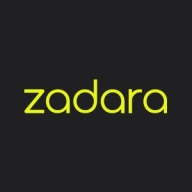


Dell ObjectScale and Zadara compete in cloud storage solutions. Dell ObjectScale has the upper hand due to its integration with Dell products and strong enterprise features.
Features: ObjectScale boasts seamless integration with Dell products like PowerScale, and provides stability with scale-out capabilities. Its S3 protocol implementation is on par with AWS S3, offering enterprise features such as immutability and geo-replication. Zadara provides multi-cloud integration with platforms like Amazon EC2, customizable storage options including SSD and SATA, and strong managed service offerings.
Room for Improvement: Dell ObjectScale could improve third-party application integration, write performance, and multi-tenancy support. Issues with technical support, documentation, and cost reductions are also areas for improvement. Zadara could accelerate feature updates, enhance its management interface for service partners, and improve iSCSI over internet connections and support for diverse platforms like IBM AIX.
Ease of Deployment and Customer Service: Dell ObjectScale is mainly used for on-premises deployments, with satisfactory support despite internal changes at Dell EMC. Zadara offers flexible hybrid and public cloud deployments, but feedback on support is limited, suggesting room for improvement in emerging regions.
Pricing and ROI: Dell ObjectScale offers a cost-effective pricing model long-term, with an initially high cost due to bundled hardware, leading to beneficial total ownership. Zadara focuses on a pay-per-use model, aligning with flexibility but potentially resulting in higher costs. Both solutions demonstrate ROI benefits, with Zadara emphasizing cost predictability and Dell offering comprehensive bundled solutions.
It does not require much management once you set up correctly, so it saves time, allowing an admin to focus on other work.
I have seen both time savings and cost savings, so there is definitely a return on investment with Dell ECS, along with peace of mind.
The cost is not cheaper compared to AWS, and we have not seen the expected return on investment.
I would rate them an eight out of ten.
The support is done through email and is not that great, making it a very problematic area I've been dealing with for over four years.
There is a lack of SUSE Linux experts which affects the level of support.
The response time and quality of the technical support are satisfactory.
Customer support is generally good but sometimes struggles with complex issues.
We lack adequate response times and a 24/7 service level agreement.
I rate the technical support from Zadara as nine out of ten.
Pure Storage FlashBlade is scalable.
Through the fabrics, it provides the clustering, allowing us to add nodes easily.
It allows scale-out processes by adding extra nodes, providing flexibility for customers to increase capacity on demand.
I would rate scalability between eight or nine, as it provides a good ability to scale and expand storage.
Zadara is a fully-fledged platform, and our customers are happy with its use.
In case there is any issue with any blade, the data is moved to another.
We have not experienced any outages in the last four years.
We use it in very critical areas inside Saudi Arabia with critical customers.
I'd rate stability maybe 9.5 out of ten.
Technical support definitely needs significant improvement.
Its configuration should be easier.
Live logs should be viewable through the GUI like with Logstash or Elasticsearch.
The deployment is not easy, and some expertise is required to configure the virtual data center and replication groups.
Incorporating extra integrations beyond S3, like Hadoop file systems, and being well aligned with trends like AI solutions would be beneficial.
Adding AI capabilities could enhance the offering as well.
Maintenance can also be complicated, especially when deeper troubleshooting requires navigating the CLI and searching for logs.
The pricing of Pure Storage FlashBlade is expensive compared to other products I used from other companies in the past, but one benefit is that they have built-in ransomware protection.
It relies on nearline SAS drives, which are cheaper than flash or SSDs.
The pricing model is on the higher side compared to other vendors.
The price is reasonable given the abundance of features, including managing, control, host resources, dockers, and containers.
The pricing is considered expensive.
We can plug in many blades, and we can have data up to one terabyte.
The best features of Pure Storage FlashBlade include better throughput and better performance.
The stability of this solution is a major advantage, as we've not experienced any outages in the last four years.
Dell ECS helps with managing storage requirements since it's S3 kind of object storage with all needed enterprise features such as immutability, snapshotting, and application management, which are nice sets of features usually required.
The impact of Dell ECS on my organization has been positive, improving user experience, security, and reliability.
The most valuable feature is its storage management capability.
Zadara's troubleshooting feature is very valuable for me.
| Product | Market Share (%) |
|---|---|
| Dell ObjectScale | 7.3% |
| Pure Storage FlashBlade | 5.7% |
| Zadara | 0.6% |
| Other | 86.4% |



| Company Size | Count |
|---|---|
| Small Business | 11 |
| Midsize Enterprise | 11 |
| Large Enterprise | 20 |
| Company Size | Count |
|---|---|
| Small Business | 12 |
| Midsize Enterprise | 12 |
| Large Enterprise | 11 |
| Company Size | Count |
|---|---|
| Small Business | 12 |
| Large Enterprise | 3 |
FlashBlade is the industry’s most advanced scale-out storage for unstructured data, powered by a modern, massively parallel architecture to consolidate complex data silos (like backup appliances and data lakes) and accelerate tomorrow’s discoveries and insights.
Dell ObjectScale is a next-generation S3 object storage platform known for scalability, performance, and efficiency. It integrates with Dell EMC products, combining hardware and software for seamless user experience in the AI era.
Dell ObjectScale implements the S3 protocol, integrating smoothly with Dell EMC solutions like ISILON. Its architecture supports data compression and interoperates with multiple protocols for enhanced performance. Enterprise features include immutability, geo-replication, and user-friendly management. However, it needs better integration with other systems, enhanced security, and disaster recovery. Write performance and scalability improvements, competitive pricing, and documentation enhancements are key areas for progress. The interface could be more straightforward, with more remote management features and native analytics.
What features does Dell ObjectScale offer?Industries leverage Dell ObjectScale for cloud-based object storage, archiving, and backups. It's favored for unstructured data management, CCTV integration, and document archiving. Strong in data analytics, it integrates well with high-capacity applications, enhancing data retention strategies across fields.
Zadara is a powerful enterprise-level storage solution whose design enables it to handle every aspect of a user’s data storage needs. It can be deployed in any location, using any protocol, and storing any data type that an organization requires. With Zadara, organizations can do everything that they were able to do with more traditional systems in a cheaper and more efficient way.
Zadara Benefits
Some of the ways that organizations can benefit by choosing to deploy Zadara include:
Zadara Features
File analytics. Organizations can leverage a powerful analytics package that can provide them with critical insights. These tools can help users sort through their data and make more informed data management decisions.
Reviews from Real Users
Zadara is a highly effective solution that stands out when compared to many of its competitors. Two major advantages it offers are its extensive suite of cloud solution integrations and its object storage capability.
Steve H., the chief technology officer at Pratum, writes, “One of the most valuable features is its integration with other cloud solutions. We have a presence within Amazon EC2 and we leverage computer instances there. Being able to integrate with computing, both locally within Zadara, as well as with other cloud vendors such as Amazon, is very helpful, while also being able to maintain extremely low latency between those connections.”
Mauro R., the CEO of Momit SRL, says, “The object storage feature is wonderful. With traditional storage, you have a cost per gigabyte that is extremely high or related to the number of disks. With Zadara Storage Cloud, you have a cost per gigabyte that you can cut and tailor to your needs independent of the number or size of the disks.”
We monitor all File and Object Storage reviews to prevent fraudulent reviews and keep review quality high. We do not post reviews by company employees or direct competitors. We validate each review for authenticity via cross-reference with LinkedIn, and personal follow-up with the reviewer when necessary.